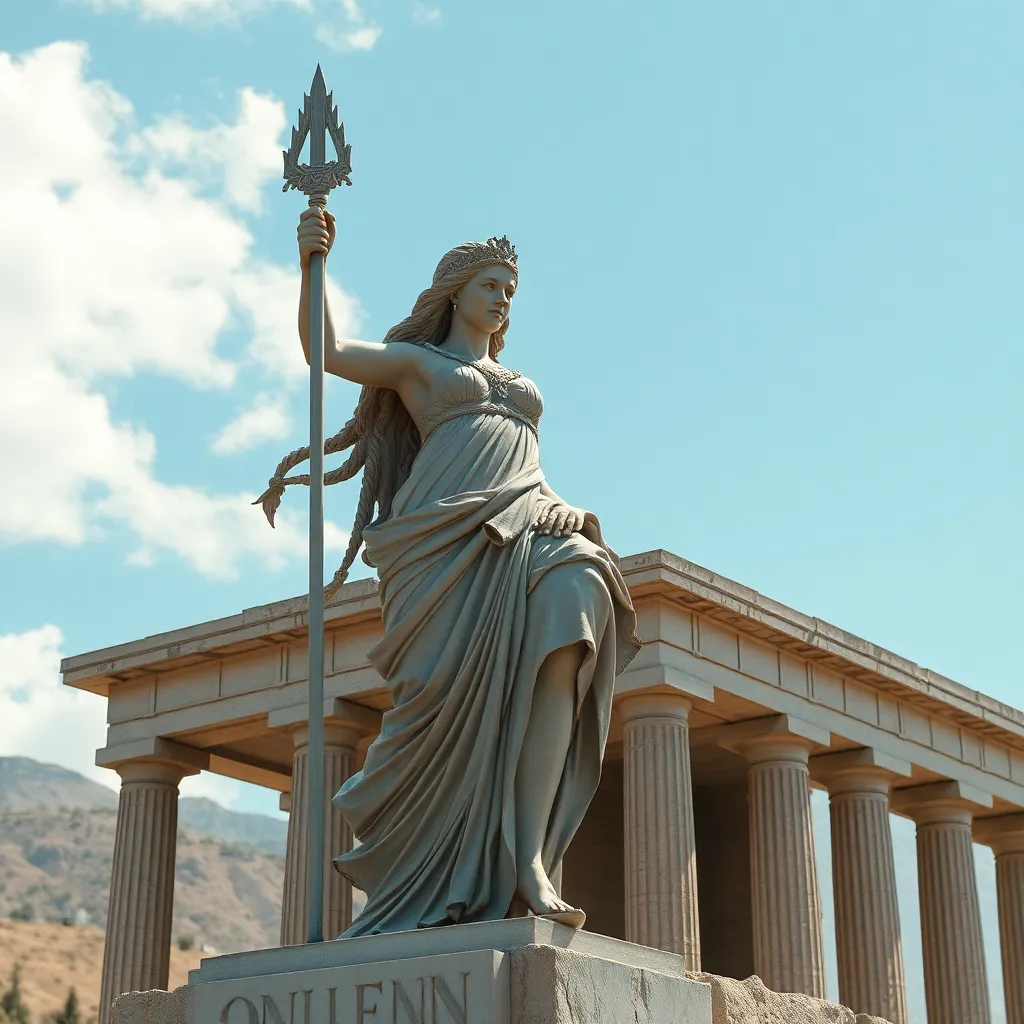Athena and the Role of Myth in Shaping Greek Identity
I. Introduction
Athena, the revered goddess of wisdom, warfare, and crafts, holds a pivotal position in Greek mythology. She is not only a key deity in the pantheon of ancient Greece but also a symbol of the values and ideals that shaped Greek identity. Myths surrounding Athena provide insight into the cultural, social, and political frameworks of ancient Greek society.
The importance of myth in shaping Greek identity cannot be overstated. Myths served as a means of explaining the world, instructing moral values, and reinforcing communal bonds among the Greek populace. This article aims to explore the multifaceted role of Athena in Greek mythology and how her stories have influenced Greek identity over time.
II. Athena: The Goddess of Wisdom and War
Athena is depicted with various attributes that symbolize her dual nature as both a warrior and a wise goddess. She is often portrayed wearing armor, carrying a shield and a spear, and accompanied by an owl, a symbol of wisdom. Her association with the olive tree represents peace and prosperity, highlighting her multifaceted role in Greek society.
As a protector of cities and civilization, Athena was particularly revered in Athens, where she was believed to watch over the city and its people. Her role contrasts sharply with other deities, such as Ares, the god of war, who represents chaos and violence. This contrast illustrates the Greek ideal of warfare as a means of achieving justice and order, rather than mere destruction.
III. The Mythological Origins of Athena
The birth of Athena is one of the most fascinating myths in Greek mythology. According to legend, she emerged fully grown and armored from the forehead of Zeus, the king of the gods. This unusual birth signifies her unique status among the Olympian deities, embodying both the intellect of her father and the strength of a warrior.
One of the key myths associated with Athena is the contest between her and Poseidon for the patronage of Athens. Poseidon struck the ground with his trident, creating a saltwater spring, while Athena offered the olive tree, symbolizing peace and prosperity. The citizens of Athens chose Athena’s gift, cementing her as their protector and goddess.
These myths not only illustrate Athena’s attributes but also impacted Greek religious practices, leading to festivals such as the Panathenaea, which celebrated her contributions to the city and reinforced civic pride.
IV. Athena in Greek Literature and Art
Athena’s presence in ancient texts is significant, with notable mentions in works by Homer and Hesiod. In the “Iliad,” she is portrayed as a strategic guide and protector of heroes, while in the “Odyssey,” she plays a crucial role in Odysseus’s journey home. These narratives highlight her wisdom and influence in the lives of mortals.
In terms of iconography, Athena has been depicted in various forms of art, including sculpture and pottery. The famous statue of Athena Parthenos, created by Phidias, is a stunning representation of her majesty and divine presence. Additionally, potters often illustrated scenes of her myths, reinforcing her importance in daily life.
Athena’s role in literature and art has been instrumental in shaping literary themes such as heroism, wisdom, and the moral values of society, serving as a model for both men and women in Greek culture.
V. Athena as a Symbol of Athens
The city of Athens is intrinsically linked to Athena, who was not only its patron goddess but also a symbol of the city’s identity. The Parthenon, a magnificent temple dedicated to her, stands as a testament to her significance in Athenian society. This architectural marvel, adorned with intricate sculptures, illustrates the myths and values associated with Athena.
Athena’s mythology contributed greatly to Athenian identity and pride. The annual Panathenaic Festival, which included athletic competitions and religious ceremonies, served to honor her and strengthen civic unity among the people of Athens.
VI. The Influence of Athena on Gender Roles and Feminine Ideals
Athena stands as a model of strength and independence for women in Greek mythology. Unlike many female figures who were often portrayed in subservient roles, Athena exemplifies a blend of warrior prowess and wisdom. This duality allows for a broader exploration of feminine virtues in Greek society.
Through her lens, Greek society could explore ideals such as:
- Intelligence and strategy in warfare
- Independence and self-sufficiency
- Wisdom as a guiding force in decision-making
The duality of Athena’s persona—as both a fierce warrior and a nurturing figure—challenges traditional gender roles and provides a complex representation of femininity in ancient Greek culture.
VII. The Legacy of Athena in Modern Greek Identity
Athena’s influence extends beyond ancient times; she continues to be relevant in contemporary Greek culture. As a symbol of wisdom, justice, and resilience, Athena embodies the ideals that resonate with modern Greek identity. Her image can be found in various forms, from literature to national symbolism.
The role of mythology in modern national consciousness is significant. Myths are celebrated and retold, reminding Greeks of their rich heritage and the values that shaped their society. Athena serves as a powerful reminder of the strength found in wisdom and the importance of cultural identity.
VIII. Conclusion
Athena’s multifaceted role in Greek identity illustrates the enduring power of myth in shaping cultures. As a goddess who embodies wisdom, warfare, and civic responsibility, Athena remains a central figure in the narrative of Greece’s past and present. Her stories continue to inspire and inform, reflecting the values and ideals that are integral to Greek identity.
In a world where the relevance of ancient myths can sometimes be questioned, Athena stands strong as a beacon of wisdom and resilience, reminding us of the profound impact that mythology can have on our understanding of identity and cultural heritage.




